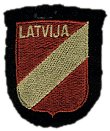The Simon Wiesenthal Centre in Jerusalem March 16, 1999
Although these units were not involved in crimes against humanity, 1many of their soldiers had previously served in the Latvian security police and had actively participated in the mass murder of civilians, primarily Jews...2The stubborn insistence of Latvia’s SS Legion veterans to conduct a public march to glorify their role as combatants on behalf of the Third Reich is a clear indication that many Latvians have still not internalised the lessons of WWII... 3not one of the numerous Latvian killers who collaborated with the Nazis has been brought to justice since Latvia obtained its independence, 4far too many Latvians feel free to identify with those who fought alongside the perpetrators of the Holocaust rather than with its victims.
Examination
Efraim Zuroff delivered the statement.
Counting Arājs's Kommando at its maximum size and other Sicherheitsdienst subordinated Sonderkommado units and collaborator battalions, the best estimate is of some 3,000 collaborators, with the proviso that most collaborator battalions provided guard duty while the Germans did the killing.
Estimates of those that the Nazis pressed into service via the Legion, Wehrmacht work battalions, and so on range to some 140,000. "Many" is subjective, not relative. One cannot state the Legion committed no crimes, but then condemn the entire Legion because the Germans deployed Holocaust collaborators into its ranks at the end of the war as the Eastern Front disintegrated.
The Latvian Legion did not fight "for" the Third Reich. That indicates a sharing of purpose if not ideology, false on both accounts.
Legionnaires sang of driving both Russians and Germans out of their homeland, as Latvians had done after declaring independence at a moment they held not one iota of the territory of their homeland, and wore a Latvian flag — their allegiance and hope for the future — under their uniforms.
This is a specious argument at best.
Arājs and his men were convicted in Germany in the 1970's. The Soviets conducted show trials in the 1960's and in cases convicted and even executed Latvians who could not have committed the crimes of which they were accused. The Mossad executed Herberts Cukurs, either the most notorious of Arājs's men or an innocent garage supervisor who Arājs hired to save him from the Nazis, bludgeoning him to death in 1965.
A host of Latvians and other former Baltic nationals targeted by Soviet propaganda were tried in Canada and the United States (minimally to be deported). These trials failed spectacularly.
Thirteen years earlier (1986, on November 18, Latvian Independence Day), Zuroff submitted Soviet propaganda to Sweden demanding war crimes indictments against Legionnaires — knowing full well it was propaganda, and then excoriated Swedish authorities for taking no action once they investigated his "evidence" and found it not credible.
The last legitimate alleged Latvian collaborator, uncovered in 1984, Konrads Kalējs, died in Australia in 2001 after protracted legal wrangling, deportations, and lost opportunities on the part of authorities in multiple countries that lasted an entire decade. Latvia had requested his extradition from Australia in 2000.
One cannot prove the negative that there were already few, if any, murderers left to be caught in 1999.
Zuroff's accusation is meritless. We are unsure how he came to this conclusion, given he elsewhere admitted he knows none of those who show up to commemorate the Legion.
